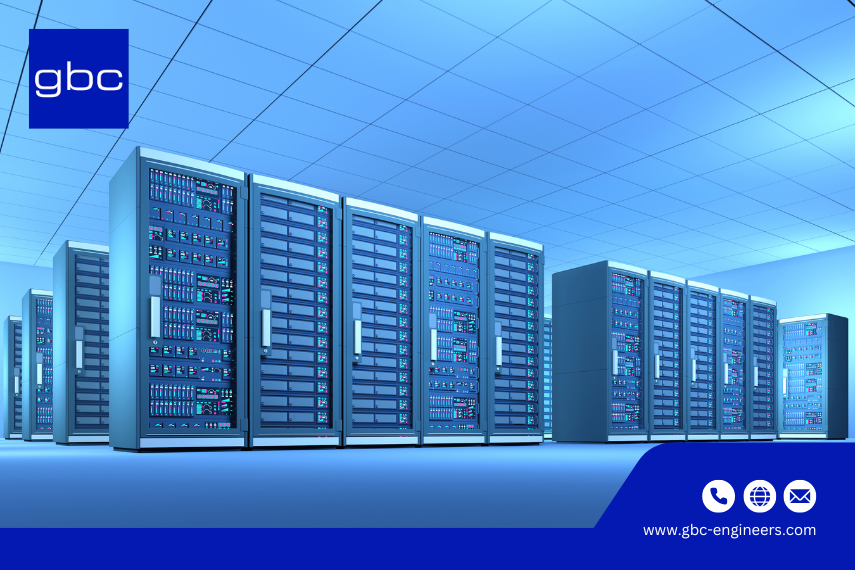In today’s digital-first world, data center management plays a pivotal role in ensuring that businesses can operate seamlessly, scale efficiently, and deliver uninterrupted digital services. But what exactly is data center management and why does it matter?
Let’s explore the essential aspects of data center management with gbc engineers and see how we help shape robust, scalable infrastructure for your business success.
What is Data Center Management?
Data center management refers to the comprehensive process of overseeing the operations, maintenance, and optimization of a data center's infrastructure. This includes managing hardware, software, networks, and data storage systems, along with ensuring security, energy efficiency, and business continuity. It also involves implementing best practices to ensure scalability and adaptability to change as business needs evolve.
As organizations handle increasing volumes of data and adopt cloud technologies, the demand for streamlined, scalable, and sustainable data center operations is more critical than ever. Modern data centers rely on centralized platforms, including DCIM software and service management systems, to gain a real-time view of their systems and improve efficiency across all components.
In many cases, adopting these technologies and tools helps organizations define terms for better decision-making, track performance more accurately, and ensure consistent uptime. Power usage is closely monitored and managed using specialized management tools to reduce costs and environmental impact.
Core Responsibilities in Data Center Management:
- Routine maintenance of data center hardware and software (installation, updates, and repairs)
- Connectivity and integration with third-party services via ISPs and NSPs
- Management of data storage, flow, and access
- Developing backup strategies and disaster recovery protocols
- Ensuring business continuity and high availability
- Providing day-to-day and emergency technical support
- Meeting compliance, privacy, and security standards
- Allocating and optimizing resources to meet operational goals
- Enabling teams to learn from data insights and performance trends
- Establishing clear contact points for internal and external stakeholders
- Adopting automation tools to provide proactive system alerts and controls

Read More: How Data Center Design Consultants Help Maximize Efficiency
What is DCIM (Data Center Infrastructure Management)?
DCIM, or Data Center Infrastructure Management, is a suite of specialized tools and platforms that help unify and optimize all aspects of data center management. Management DCIM combines software, sensors, and automation to give IT teams real-time insights into energy usage, server performance, network bandwidth, temperature levels, and equipment health—whether deployed on-premises or in the cloud.
Key Benefits of DCIM:
- Real-time infrastructure monitoring
- Efficient resource allocation and capacity planning
- Compliance with ITIL standards
- Automated alerts and threshold tracking
- Enhanced data center uptime and resilience
- Elimination of outdated tracking tools like spreadsheets
By using DCIM systems, data center managers can centralize control over critical assets and ensure alignment with enterprise goals—delivering smarter infrastructure decisions across hybrid and cloud environments.
Future Trends in Data Center Management
As technology evolves, data center management is also shifting toward automation, virtualization, and remote monitoring. Here are some key trends to watch in 2025 and beyond:
1. Rise of Hybrid Data Centers
Modern businesses are adopting hybrid architectures—blending on-premises servers with public and private cloud solutions. Managing this hybrid environment through unified tools and center infrastructure management DCIM platforms is essential for scalability, visibility, and security.
2. Remote Monitoring and Control
Advanced DCIM platforms now allow full remote operation, including diagnostics, environmental controls, and workload distribution. This reduces reliance on physical presence and improves agility.
3. AI & AIOps Integration
Artificial Intelligence for IT Operations (AIOps) is being integrated into data center infrastructure to analyze patterns, predict failures, and automate maintenance. The goal: fully autonomous data centers with minimal human intervention.
4. Focus on Sustainability
With rising energy costs and climate concerns, sustainable data centers are becoming the norm. Managers must implement green energy solutions, optimize cooling systems, and reduce carbon emissions while maintaining uptime.
For organizations managing sensitive information or regulated workloads, aligning with a clear privacy policy and ensuring secure, compliant operations is more important than ever.
Read More: What Are Data Center Solutions? A Comprehensive Overview
Common Challenges in Data Center Management

Despite advancements, managing a data center comes with its own set of challenges:
1. Complexity of Multi-Vendor Environments
Managing hardware and software from different vendors can create compatibility and integration issues. Management software must be capable of bridging diverse systems to ensure seamless operations.
2. Meeting SLAs and Compliance
Tracking service level agreements, data retention policies, and recovery time objectives is time-intensive but vital.
3. Budget Constraints
Costs related to staffing, energy, and cooling often consume a large portion of the IT budget.
4. Limited Resources
Lack of staff, power, or space makes scaling difficult without the right tools.
5. Warranty and Contract Tracking
Losing track of warranties or licenses leads to unnecessary expenses and delays in replacements.
6. Energy Efficiency Goals
As organizations move toward net zero, data center managers must innovate with less—cutting power usage while ensuring performance.
Ready to Future-Proof Your Data Center?
Partner with gbc engineers to design a facility that delivers performance, reliability, and long-term value.
🌐 Visit: www.gbc-engineers.com
🏗️ Explore Our Services: Services - gbc engineers
Conclusion
Effective data center management is crucial for ensuring the reliability, efficiency, and security of IT services. By embracing modern tools like DCIM, addressing common challenges, and staying abreast of emerging trends, organizations can optimize their data center operations to meet current demands and future growth.
At gbc engineers, we understand the critical role that well-managed data centers play in digital infrastructure. With our expertise in structural and MEP design for data center facilities, we help clients build resilient, scalable, and sustainable environments that support next-generation IT needs.